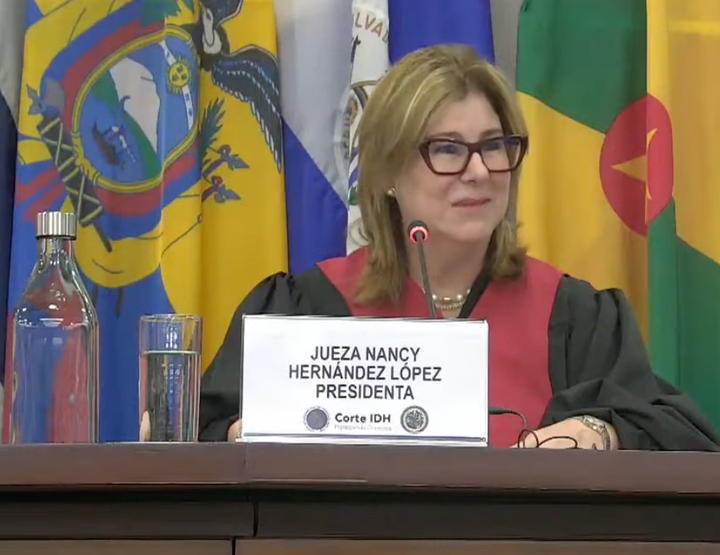European Court Of Human Rights Holds Its First Hearings On Climate

For the first time, an international human rights court in Europe held a pair of hearings on cases seeking to hold governments accountable for their role in contributing to the climate crisis and allegedly failing to protect citizens from worsening climate impacts such as extreme heat and flooding. The two climate cases argued before the European Court of Human Rights on March 29 could set a precedent in establishing states’ obligations to take more ambitious climate action in order to safeguard human rights under European law.
The European Court of Human Rights, located in Strasbourg, France, currently has a handful of climate lawsuits pending before it that challenge government policy or conduct in the context of the climate emergency. Two of those cases came before the court’s Grand Chamber panel of 17 judges last week and a third case is set to be heard by the same panel later this year. These leading cases will render judgements in which the court will grapple with the impacts of climate change on human rights and determine whether breaches of rights have occurred stemming from European states’ alleged failure to effectively mitigate greenhouse gas emissions.
In the first cases to come before the court on March 29, the climate ambitions and actions of the governments of Switzerland and France are at issue, charged by the plaintiffs (or applicants in this context) to be woefully inadequate. Both cases claim that this inadequate climate action amounts to violations of the rights to life and to family and private life under Articles 2 and 8, respectively, of the European Convention on Human Rights. The case Verein KlimaSeniorinnen Schweiz and Others v. Switzerland, heard first by the Grand Chamber panel, contends that Switzerland’s failure to do its “fair share” to reduce emissions in line with limiting temperature rise to no more than 1.5°C threatens the lives and health of elderly women who are more vulnerable to extreme heat spells. An association of Swiss senior women with over 2,000 members, along four individual elderly women, are the applicants behind this case. In the second lawsuit heard by the court, Carême v. France, the applicant is an individual claiming to be personally affected by the level of climate mitigation undertaken by the French government, as the coastal community that he calls home is at risk of severe flooding and inundation from rising seas. In both cases the applicants argue the state should be doing more to slash emissions and mitigate dangerous warming. The respondent governments defended their climate policy during the hearings, insisting that their climate commitments are sufficient to be protective of citizens’ rights.
First Up: The Swiss Case
The KlimaSeniorinnen lawsuit, lodged with the Strasbourg court in November 2020, seeks to compel Switzerland to reassess its climate targets and take more protective measures to safeguard individuals, particularly the elderly, who are already experiencing adverse health effects as warming intensifies. The complaint asserts violations of Articles 2 and 8 of the European Convention on Human Rights, and the case before the European Court of Human Rights also claims breaches of the applicants’ procedural rights, including access to a court and to an effective remedy. The Swiss domestic courts dismissed the case without properly considering the merits, the applicants say, determining that the senior women are not special “victims” of climate change and that their rights had not yet been violated.
These determinations were erroneous, the counsel for the Swiss senior women told the Grand Chamber panel. “The Swiss courts refused to determine the applicants’ claims, finding there was still time before the Paris Agreement’s temperature thresholds would be breached,” Jessica Simor, counsel for the applicants, said during her presentation at the hearing. “To suggest that until one reaches the moment of catastrophe one’s rights are not affected is to ignore the reality,” she argued, adding: “The applicants before you today are already suffering from the effects of climate change.”
Simor explained how the intensifying impacts of extreme heat events pose serious threats to elderly women’s health and to their very existence, noting that these heat extremes are occurring more frequently and are projected to worsen as the climate crisis continues.
Anne Mahrer, co-president of Senior Women for Climate Protection Switzerland, said that judicial intervention is necessary because “Switzerland is doing far too little to contain the climate catastrophe. Rising temperatures are already having serious impacts on our physical and mental health. The big spike in heat waves is making us older women sick.”
It even poses life-threatening risks especially to the elderly, as people become less capable of regulating internal body temperature as they age. “No one before this court disputes that heat kills,” Simor said, noting that “women over 65 are at real risk of not only serious mental or physical impairment, but of death.”
Counsel for the Swiss senior women argued that these impacts and risks can be linked to Switzerland’s allegedly ineffective climate mitigation measures. They say that failing to undertake only the most ambitious climate action, and what scientific experts have calculated as each state’s “fair share” of emissions reduction, exacerbates the climate crisis and contributes to the collective risk of the world overshooting the 1.5°C or even 2°C warming thresholds, where many adverse impacts become compounded and irreversible.
“Every increment of global warming will intensify multiple and concurrent hazards,” Simor said, citing the latest summary report from the Intergovernmental Panel on Climate Change released on March 20. This scientific finding weakens the defense that emissions from any single state or actor is relatively insignificant on a global scale, counsel for the applicants maintain.
The hearing discussed Switzerland’s climate policies and targets, with the applicants’ counsel claiming they fall far short of what is necessary for the state to do its fair share in the global climate fight. According to Simor, expert scientific assessments have calculated what each state’s fair share of emissions reduction should be, based on the remaining ‘carbon budget’ and accounting for historical responsibility and current capabilities – for Switzerland, it is calculated at up to 200 percent emissions reduction (below 1990 levels) by 2030, meaning some of that reduction would entail assisting other nations in decarbonizing. Although Switzerland has increased its domestic 2030 climate target, it has not taken legislative effect and the current policies are “insufficient” to be compatible with the Paris Agreement objectives, according to Climate Action Tracker, an independent climate policy assessment initiative.
The Swiss government disputed the claim that it is failing to take adequate action on climate. “The Swiss government is fulfilling its duty to afford protection of the applicants’ rights,” Franz Perrez, the Swiss ambassador for the environment and chief negotiator for Switzerland at the UN Framework Convention on Climate Change Conference of the Parties, argued at the hearing. He asserted that Switzerland is complying with “all obligations under the Paris Agreement” and contended that there is no internationally established objective criteria to determine what constitutes a country’s “fair share” of emissions reduction.
Another Swiss government representative, Alain Chablais, offered several reasons for the court to reject the applicants’ case. Climate and environmental policymaking must be a democratic process and is not suitable for judicial review, he claimed. He also argued that a direct causal connection cannot be established between the government’s conduct and the alleged climate-related harm, and said that there is no immediate risk to the applicants’ lives.
The government of Ireland is one of the European states backing Switzerland’s position as a third-party intervenor in the case. Catherine Donnelly, a lawyer for Ireland, presented during the hearing claiming that the case unjustifiably extends the scope of the European Convention on Human Rights and that a positive judgment would bypass the democratic political process and upset the international regime on climate governance.
A lawyer for the European Network of National Human Rights Institutions, which is intervening in support of the applicants, said that those claims are wrong. Scrutiny of a state’s emissions reduction would strengthen democracy and would indeed be consistent with international law, argued Jenny Sandvig, counsel for the Network. “Courts worldwide confirm that states may be held accountable for harm caused in its territories by climate change, because any reduction in emissions matters,” she said.
The Carême Case
In the afternoon hearing on March 29, the Grand Chamber panel listened to presentations from the French government and from the lawyer representing the plaintiff or applicant, Mr. Damien Carême, who is likewise suing the state for allegedly failing to take adequate climate protection measures. Carême initially brought his legal challenge before a French court as the mayor of a coastal community called Grande-Synthe that is at severe risk of flooding. The French court – the Conseil d’État – dismissed his personal interest in the case but upheld the community’s right to sue the state, and ultimately ordered the French state to take additional measures to ensure it would comply with its 2030 emissions reduction target – a 40% cut in emissions.
Carême took his case to the European Court of Human Rights seeking to compel France to take more aggressive mitigation measures, and claiming that he is personally impacted by climate change as he expects his home community to be compromised by climate-induced flooding. His health is also impacted as he suffers from asthma.
Diégo Colas represented the French government at the hearing and argued that the flood risk is too remote and general to constitute violations of rights. He additionally claimed that France is taking appropriate climate action and that the Paris Agreement does not indicate how to calculate a “fair share” of emissions reductions.
But according to Corinne Lepage, a lawyer representing Carême, measures taken by the government “remain insufficient to meet even the inadequate climate target of 40 percent emissions reduction by 2030.”
Several of the Grand Chamber judges asked questions about Carême’s current residency. In responding, Lepage clarified that her client now lives in Brussels, Belgium while he serves on the European Parliament. But she said that he remains deeply connected to Grande-Synthe with close family ties there and that he expects to return as a resident in the future.
The Grand Chamber said it will issue a decision on the cases at a later date.


